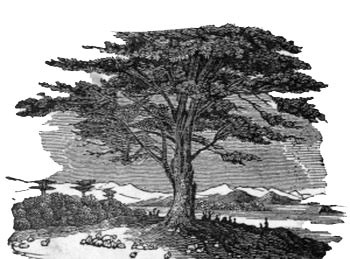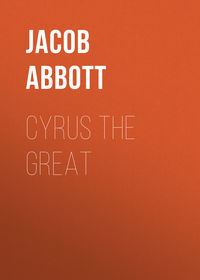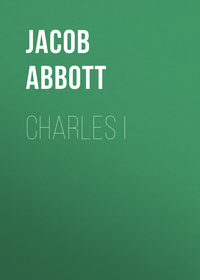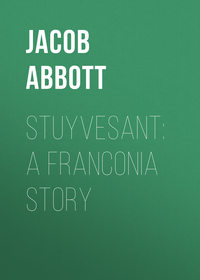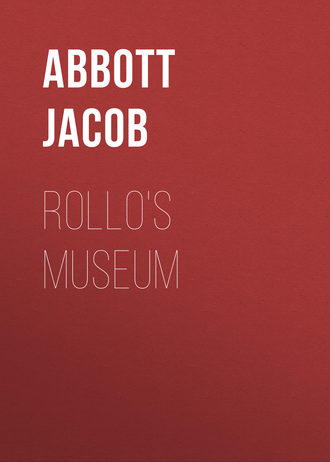
Rollo's Museum
Rollo asked his father to let him take off his shoes and stockings; and he did so. Rollo put each stocking into its shoe, to keep them dry, and then laid them down upon the sand beyond the reach of the waves. Then he would watch the waves, and whenever the water retreated, he would follow it down until he met the new wave coming curling up at him, when he would turn and run, the wave after him, to the shore; and when the wave broke, it would throw the water all around his feet.
Lucy and Mary walked along the other shore at a greater distance, looking for shells. They found a great many. Rollo could hear their exclamations of delight at every new shell they found, and they were continually calling upon him to come and get some too; but he was too much occupied with the surf.
At length, Rollo’s attention was excited by hearing Lucy call out,
“O Mary, Mary! I have found a piece of sponge.”
Rollo turned around to look. He had just run up from the water, and was standing beyond the reach of the surf, though the water which each wave, as it broke, sent up upon the shore, played around his feet.
“How big is it?” said Rollo,
“About as big as my finger.”
“Ho!” said Rollo; “that is not very big.”
Just at this instant, a wave larger than usual burst just behind Rollo, and it sent up a torrent of water all around him, which rose almost up to his knees. Rollo was frightened. He started to run; but so much water confused and embarrassed him. He staggered.
“Stand still, Rollo,” said his father.
Rollo then stood still; but by this time the water was receding, and his eyes fell upon his two shoes, which had been taken up by the wave, and were now running rapidly down from the shore, each loaded with its stocking. Rollo ran to seize them, and had just time to get them before the next wave advanced and was ready to dash over them. He ran up upon the sand, and put his shoes several yards from the highest place that the water had come to.
“There,” said he, looking back at the waves, “now get my shoes if you can!” The waves said nothing, but went on breaking and then retreating, just as before.
Rollo then went to where Mary and Lucy were, and began to collect shells. They found quite a number of different kinds, all along the shore. Some were large and coarse,—broken and worn by the water. Some were so thin and delicate that he had to wrap them up carefully in a paper, and put them into his waistcoat pocket, in order to get them home safely. The children found several other curiosities besides shells. They collected pebbles, and specimens of sand, of different colors. Mary found an old iron spike, perhaps part of a vessel, with the sand and gravel concreted around it. It looked like stone growing upon iron. Rollo also found a small piece of wood, battered and worn by the long-continued action of the waves, and he thought it was very curious indeed. In fine, the children filled their baskets with wonders, and, after about three quarters of an hour, they set out on their return home. When Rollo went to get his shoes, he found the water almost up to them. If he had staid away a little longer, they would have been washed away again. The truth was, the tide was rising.
THE CLIFFS
As the party slowly rode away from the beach, Rollo’s mother asked if it was too late to go to the cliffs. There was a splendid prospect from the cliffs. They were rocky precipices overhanging the sea, at the extremity of a point of land, about a mile from the beach where they had been. The two girls wanted to go very much; but Rollo did not care so much about it. He was in haste to get home and arrange his curiosities.
His father, however, after looking at his watch, said that he thought there would be time to go. So he turned his horse’s head in the right direction, and they went to the cliffs.
The precipices were very high, and the swell of the sea dashed and roared against them at their foot; and yet the water looked very smooth at a little distance from the land. Rollo wondered why there should be waves along the beach and against the rocks, when there were none out in the open sea.
“I should think, father,” said he, “that it would be calmer near the shore, and more windy out upon the water.”
“It is,” said his father.
“Then, why are not the waves bigger?”
“They are full as big.”
“Why, father,” said Rollo, “there are no waves at all out from the land.”
“You can’t see them very well,” said his father, “because we look down upon them. When we are upon a mountain, the small hills below almost disappear. Besides, the waves out in the open sea, in such a still time as this, are in the form of broad swells; but these swells are broken when they roll against the shore, and so this makes the surf.”
“I mean to look over and see,” said Rollo, and he walked cautiously along towards the precipice.
“O Rollo,” exclaimed Mary, “don’t go so near!”
“Why, there is no danger,” said Rollo.
“Rollo! Rollo!” exclaimed Mary again, as Rollo went nearer and nearer.
His father had turned away, just as he had finished what he said above, and so had not observed what Rollo was doing. In fact, he did not go near enough to the brink to be in any danger, though Mary was afraid to have him so near.
His mother, hearing Mary’s call, turned to see what was the matter, and she, too, felt afraid at seeing Rollo so near. She called him to come away; but Rollo told her that he was not near enough to fall.
“But I had rather that you would come away,” said his mother; and she looked very anxious and uneasy, and began to hurry along towards him.
“You see that large island off to the right,” said Rollo’s father, directing her attention in the right quarter.
“Yes, I see it—Rollo!”
“Well, that is George’s Island. There is a rock lying just about south of it.”
“Yes,” said Rollo’s mother, “I believe I see it,” beckoning at the same time to Rollo.
Her mind was evidently occupied with watching Rollo. She looked first at the rock and island, where Mr. Holiday was pointing, and then back at Rollo, until at length Mr. Holiday, perceiving that her mind was disturbed by Rollo’s motions, said to him,
“Rollo, keep outside of us.”
“Outside, father!” said Rollo; “how do you mean?”
“Why, farther back from the brink than we are.”
So Rollo walked reluctantly back until he was at about the same distance from the brink with his father, and then began to take up some little stones, and throw them over. His father and mother went on talking, though Rollo’s stones disturbed them a little. At length, Rollo came and stood near his father to hear what he was saying about a large ship which was just coming into view behind the island.
As he stood there, he kept pressing forward to get as near to the brink as he could, without actually going before his father and mother. She instinctively put out her hand to hold him back, and was evidently so uneasy, that Mr. Holiday looked to see what was the matter. Rollo had pressed forward so as to be a very little in advance of his father, though it was only very little indeed.
“Rollo,” said his father, “go and sit in the carryall until we come.”
Rollo looked up surprised, and was just going to ask what for. But he perceived at once that he was in advance of his parents, and that he had consequently disobeyed his father’s orders. He went away rather sullenly.
“I was not more than an inch in advance of where they were,” said he to himself; “and, besides, it was far enough from the brink. I don’t see why I need be sent away.”
However, he knew that he must obey, and he went and took his seat in the carryall. It was turned away from the sea, and he had nothing before him but the inland prospect.
“What dismal-looking rocks and hills!” said he to himself. They had appeared wild and picturesque when he first came in view of them, but now they had a very gloomy expression. He who is dissatisfied with himself, is generally dissatisfied with all around him.
Rollo waited until he was tired, and then he had to wait some time longer. At length his father and mother appeared, and Rollo jumped out, and asked his father if he might ride in the wagon, and drive the girls again.
“No,” replied his father, “I have made another arrangement. Jonas,” he continued, “you may get into the wagon, and drive on alone.”
Rollo’s father then helped Mrs. Holiday and Mary into the back seat, while he put Lucy and Rollo on before, and he took a seat between them. When they had rode on a little way, he said,
“I was very sorry to have to send you away, Rollo.”
“Why, father, I was not more than an inch before you.”
“That’s true,” said his father.
“And I don’t think I was in any danger.”
“I don’t think you were myself,” said his father.
“Then, why did you send me back?”
“For two reasons. First, you disobeyed me.”
“But I don’t think I came before you more than an inch.”
“Nor I,” said his father; “very likely it was not more than half an inch.”
“And was that enough to do any harm?”
“It was enough to constitute disobedience. I told you to keep back, outside of us, and by coming up even as near as we were, you showed a disposition not to obey.”
“But I forgot,” said Rollo. “I did not observe that I was so near.”
“But when I give you a direction like that, it is your duty to observe.”
Rollo was silent. After a short pause, he added,
“Well, father, you said that there were two reasons why you sent me away.”
“Yes, the other was that you were spoiling all the pleasure of the party. You kept Mary and mother continually uneasy and anxious.”
“But I don’t think I went into any danger.”
“Perhaps not; that is not what I charge you with. I did not send you away for going into danger, but for making other persons anxious and uneasy.”
“But, father, if there was not any danger, why need they be uneasy?”
“Do you suppose that persons are never made uneasy and anxious, except by actual danger?”
“Why—I don’t know, sir.”
“If you observe persons carefully, you will see that they are.”
“Then they must be unreasonable,” said Rollo.
“Not altogether,” said his father. “If you were lying down upon the ground, and I were to come up to you with an axe, and make believe cut your head off, it would make you very uneasy, though there would be really no danger.”
“But this is very different,” said Rollo. “That would have been as if I had made believe push mother off.”
“That would have been more like it, I confess. But I only meant to show you that it does not always require real danger, to make any one uneasy and anxious. When we see persons in situations which strongly suggest the idea of danger to our minds, it makes us uneasy, though we may know that there is no actual danger in the case. Thus it is painful to most persons to see a carpenter upon a very lofty spire, or to go very near a precipice, or see any body else go, even when there is a strong railing; and so in all other cases. Therefore, our rule ought always to be, when we are in company with others, not only not to go into actual danger, but not to go so near as strongly to bring up the idea to their minds, and thus distress them.”
“I never thought of that before,” said Rollo.
“No, I presume not. And I had not time to explain it to you when we were upon the cliffs, and so I simply directed you to keep back of us. That would have prevented all trouble, if you had only obeyed.”
Rollo was silent and thoughtful. He was sorry that he had disobeyed.
“However,” continued his father, “I am very glad I have had this opportunity to explain this subject to you. Now, I want you to remember, after this, that the best way, in all such cases, is to consider, not what the actual danger is, but what the feelings and fears of those who are with you may be. It is not your own safety, but the comfort of others, that you have to look out for.”
“Yes, sir,” said Rollo, “I will.”
“Once there were two young men,” continued his father, “taking a ride in chaises. Each had his sister with him. They came to an old bridge that was somewhat decayed, and it led across a very deep ravine which looked very frightful, though in reality the bridge was perfectly strong and safe. Now, when the first chaise came near, the girl who was in it cried out,
“‘O brother, what a bridge! O, I must get out and walk over it. I don’t dare to ride over such a bridge.’
“‘Poh, nonsense!’ said Henry. Her brother’s name was Henry. ‘The bridge is strong enough for a four-ox team. I have been over it a dozen times.’ So he drove on. His sister looked very much terrified when they came upon the bridge, but they went over safely.
“‘There,’ said Henry, when they had got over, ‘I told you it was safe.’
“When the other chaise came down, the young lady said the same thing to her brother, whose name was Charles. She said she was afraid to ride over.
“‘Very well,’ said Charles. ‘The bridge is safe enough, but I think, perhaps, it may be pleasanter for you to walk over. It will rest you to walk a little, and besides, you can stop to look at the pleasant prospect, up and down the river, from the middle of the bridge.’
“So his sister got out, and he drove the chaise over carefully, while she walked behind. Now, which do you think took the best course, Charles or Henry?”
“I—don’t know,” said Rollo.
“The way to determine,” said his father, “is to apply the Savior’s rule, ‘Do unto others as you would have others do unto you.’”
“Well, I think,” said Rollo, “that I should rather get out and walk.”
“I am sure I should,” said Lucy.
The whole party, after this, got safely home, though it was too late, that night, to arrange their curiosities. They, however, looked them all over the next day, and they made a very large and valuable addition to their cabinet. The specimens of sand of different colors they arranged in little, square, pasteboard boxes, which Mary made, covering them neatly with blue paper upon the outside, and with white paper within.
THE THREE NORTHMEN
The summer and autumn passed away, and the winter came on. Rollo was having a new great-coat made. He had grown too big for the old one, and so his mother had laid it aside, waiting for Nathan to grow up to it.
When Rollo’s coat was done, he went out to show it to Jonas. It was thick and warm, with large cuffs, and there was a good warm collar to come up about his ears.
“And see,” said Rollo, throwing the coat back, and slipping one of his arms out, “see how easy it comes off and on!”
“Yes,” said Jonas, “and that is a great convenience in a great-coat. It is a very fine great-coat, indeed. I think, with that on, you will be able to make your stand against all three of the Northmen.”
“All three of the Northmen!” repeated Rollo. “Who are the Northmen?”
“Don’t you know who the three famous Northmen are,” said Jonas, “who do so much mischief?”
“No,” said Rollo, “I never heard of them before.”
“Well,” said Jonas, “I will tell you some time, but now I must go away with the cart.”
Jonas had been harnessing the horse into the cart, in the yard, while Rollo had been talking with him, and now was about ready to go away. Rollo determined to ask his mother to let him go with him.
“Where are you going, Jonas?” said he.
“Down into the woods,” said Jonas.
“Wait a minute for me.”
So away Rollo ran to ask his mother. She said, yes; and he accordingly came out and took his seat, by the side of Jonas, upon a board which was placed across the cart, from one side to the other.
Jonas was going down into the woods to bring up a load of wood which he had obtained from the trimmings of the trees. It was a cold, frosty morning, and the winter was near; and Jonas wished to get the wood in before the snow should come and cover it up. Rollo was so much interested in driving the cart down, and then in loading it with wood, that he forgot to ask Jonas about the three famous Northmen.
About a month after this, there were a few very cold mornings. The ice froze very hard in a tub of water before the pump, and Jonas had to cut a hole in it with the axe, for the horse to drink.
Rollo saw him through the kitchen window, and he opened the door and ran out a moment to see him. Jonas was cutting away very carefully all around the sides of the tub, so as to get the whole mass of ice out together. Rollo stood looking on, shivering. He had no hat on, and only slippers upon his feet. He stood leaning a little forward, his arms hanging off from his sides as if they were driven off by electric repulsion.
“A’n’t you cold?” said Rollo to Jonas.
“No,” said Jonas, “not at all.”
“I am; and I can’t stay out here any longer, I am so cold.”
“You are not prepared for it; that is the difficulty. Go and put on your boots, and your cap, and your mittens, and button up your jacket, and come out here and go to work with me, and you won’t be cold.”
Rollo ran in and got his boots; and after warming them by the kitchen fire, he put them on. He also buttoned his jacket up to his chin, and drew on his mittens, and put on his cap. He then went out again to find Jonas.
He found him in the barn, pitching down hay.
“Now,” said Rollo, as he came up the stairs, “what shall I do?”
“Ah, you have come out to work, have you?” said Jonas. “Well, take this pitchfork, and mount up upon the loft there, and pitch me down some hay.”
Rollo found it very hard to get up upon the loft. There were only some pegs, driven into a post, to climb up by. However, with Jonas’s help, he got up, and then clambered over upon the hay; and Jonas threw the pitchfork up after him.
“Now work moderately,” said Jonas, “and I’ll insure that the Northmen can’t touch you.”
“O, there!” said Rollo, “you have never told me about the Northmen.”
“Well,” said Jonas, “I will tell you now, when you come down.”
After pitching the hay down a little while, Rollo descended, though it was not necessary for Jonas to help him, for he jumped down upon the heap of hay which he had made. They then went together, attending to Jonas’s work about the barn, while Rollo stopped occasionally to look out the open door or window, where the sun was shining in very pleasantly. Rollo began to think it was a warm, pleasant morning.
“There is one of the Northmen,” said Jonas, “that you are somewhat acquainted with already.”
“What is his name?” said Rollo.
“Captain Jack Frost,” replied Jonas.
“O, yes,” said Rollo, with a smile, “I have heard of that gentleman before.”
“Yes,” said Jonas, “he is pretty well known. He is a great mischief-maker. He lives in an ice castle at the North, and in the fall of the year he comes creeping along in the still nights, and early in the mornings. He builds bridges over the ponds, and brooks, and plants little gardens of hoar frost; and where he sees a stone in the ground, he stamps his foot upon it, and crowds it down a little way. Then it is his great delight to go about pinching boys’ toes and noses. He is a sly rogue.”
“And who are the other Northmen?” said Rollo.
“The next is General Boreas,” said Jonas.
“General Boreas!” repeated Rollo; “and who is he?”
“O! he is a terrible fellow,” replied Jonas. “He comes roaring and thundering along the tops of the forests at midnight, in snowstorms and hail. He buries up the whole country, he breaks down the trees, and sometimes unroofs the houses. Then, if he finds any poor traveller out, he whistles and roars about his ears, and tries to frighten him; and he throws snow into his face, and heaps it up all about him in order to bury him up if he can.
“Then, besides,” continued Jonas, “the old stormer has another way of making mischief. After he has got the valleys and streams covered and filled with ice and snow, he brings on a tempest of wind and rain, and fills the land with torrents, which raise the streams, and tear up the ice, and carry it down in vast, broken, and jamming blocks, which break down the bridges, and carry away dams, and spread all over the meadows, frightening a good many families out of their beds at midnight.”
“Is that the way that General Boreas acts?” said Rollo.
“Yes,” replied Jonas, “that’s the way.”
“And who is the third Northman?” said Rollo.
“His name is Old Zero,” replied Jonas. “He is more than threescore years and ten, a great deal; his head is hoary, and his beard is long and gray. He creeps softly along after General Boreas has worked himself out of breath, and gone away. He curtains over all the windows with frost work in the night. He likes the night, when it is calm and still, and the stars are shining bright and cold all over the sky. And he kills more people than Boreas does.”
“Kills them?” said Rollo.
“Yes,” replied Jonas. “He makes no blustering, but he stings bitterly, and the poor traveller has his ears, and hands, and feet frozen before he knows what a cruel enemy is around him. Captain Jack Frost you may laugh at,—but as to Old Zero, you had better beware of him.”
Rollo laughed a good deal at Jonas’s account of the three Northmen, and Jonas told him that they sometimes made some splendid curiosities, which would be beautiful for a shelf in his museum, if they would only keep.
“What are the curiosities?” said Rollo.
“O, all kinds of stars, and spangles, and snow-flakes, of a great many beautiful forms,—and icicles, and frost work. But they will not keep very long, unless you make a cabinet expressly for them.”
“I can’t make a cabinet,” said Rollo.
“O, yes, you can,—a frost-cabinet,” said Jonas.
“How?” asked Rollo.
“Why, you must go down near the brook, in the middle of the winter, and make a little room of snow. Then you must get a large piece of thin, clear ice from a still place in the brook, and fix it in for a window. You must also get some sheets of white ice, or snow crust, for shelves, and put your frost curiosities upon them. If you make it in a cold place, they will keep for some time.”
“I will make a frost museum,” said Rollo. “I mean to go down to-day and look out a place.”
“Yes,” said Jonas, “and you can keep it a secret until it is done, and then take your father and mother down to see it, and surprise them.”
“Yes,” said Rollo, clapping his hands, “so I will.”
